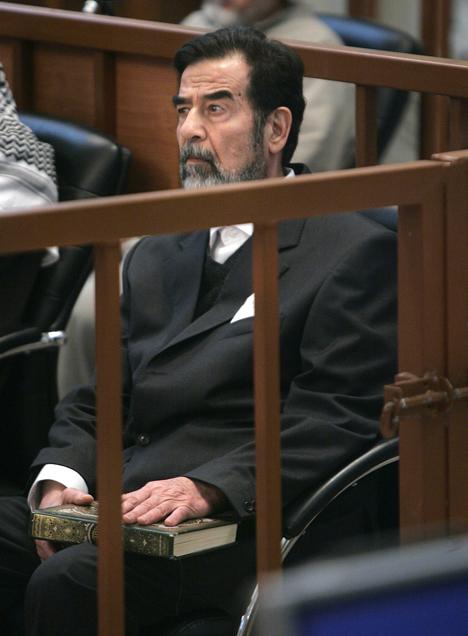Hussein on hunger strike
Jul 24, 2006
Last updated on May 12, 2016 at 03:51 a.m.
BAGHDAD, Iraq – Saddam Hussein was hospitalized Sunday and fed with a tube on the 17th day of a hunger strike to ensure he was healthy enough to continue with his trial, the chief prosecutor said. The procedure came as the ex-leader’s troubled trial nears a verdict that could lead to his hanging.
Prosecutor Jaafar al-Moussawi said he learned that Saddam’s health had become “unstable because of the hunger strike” during a visit to the U.S.-run prison where the former ruler and his seven fellow defendants are held.
“We took him to the hospital, and he is being currently fed by a tube,” al-Moussawi told The Associated Press without elaboration.
Al-Moussawi said the feeding tube had stabilized Saddam’s health and the former president would appear in court as scheduled this week. Saddam was not scheduled to appear Monday when the trial resumes after a two-week break, because other defendants are to give their final summations.
Get The Daily Illini in your inbox!
It appeared that al-Moussawi had become concerned about the effects of televised pictures of a frail, weakened Saddam appearing in court and decided to check on the ex-president himself since the Americans were continuing to insist that a 69-year-old man’s health was unaffected despite two weeks without food.
The hunger strike was launched to demand better security for the defense team. Three of them have been assassinated since the trial began, most recently Khamis al-Obeidi, who was abducted and slain June 21.
The defense rejected an offer of the same security provided to the judges and prosecution lawyers: residence inside the Green Zone, the fortified Baghdad neighborhood where the court is located. Instead, they wanted bodyguards.
Saddam and the seven others have been on trial since Oct. 19 for the deaths of Shiite Muslims after a crackdown in the town of Dujail, which was launched after an assassination attempt there in 1982. They could receive the death penalty if convicted.
But Saddam’s lawyer Khalil al-Dulaimi said none of the defendants or their lawyers would appear Monday unless the court “meets the minimum requirement ensuring a fair trial for the defendants.”
Al-Dulaimi told The Associated Press that Saddam was “in high spirits and his health very good” despite the hunger strike.
U.S. officials had acknowledged that Saddam and three other detainees were refusing food since the evening meal of July 7 but were drinking coffee and sweet tea. The Americans insisted that Saddam was still in good health despite two weeks without food, and that he had been advised by “medical professionals” of the dangers of not eating.
A spokesman for the U.S. detention command would not say whether Saddam had been hospitalized but said he was under medical supervision and was “voluntarily” taking nutrients through a feeding tube.
“He’s continuing to refuse meals,” Lt. Col. Keir-Kevin Curry said. “He remains in coalition care and custody, and we’re providing appropriate medical care.”
U.S. officials have not identified the others who were refusing food, but defense lawyers said they are co-defendants Barzan Ibrahim, Saddam’s half brother; former Vice President Taha Yassin Ramadan; and Awad al-Bandar.
The defense team blamed al-Obeidi’s killing on Shiite militiamen and announced it would boycott the trial in protest with the lack of security.
In a letter to the court, the defense said it wanted U.S. authorities to provide security for the lawyers and their families.
It also demanded a 45-day recess to allow it to prepare closing statements and as much time as they want to present final arguments.
Chief Judge Raouf Abdel-Rahman suspended the proceedings July 11 and warned that if the defense did not appear Monday, he would appoint other attorneys to make the final summations.
Al-Bandar and Ramadan were to make final arguments Monday, followed by Saddam and Barzan.






